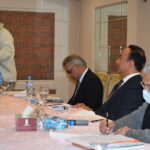ISLAMABAD, Pakistan: A “National Conference on Minorities and Education System of Pakistan: Challenges and Prospects” was organized in Islamabad on Friday under the auspices of the Centre for Social Justice (CSJ) and the Peoples’ Commission for Minorities Rights (PCMR).
The Conference was attended by educationists, researchers, rights activists and representatives of the Ministry Of Education and hundreds of participants online from across the Country.
In his remarks at the Conference, the Author, Educationist, Research & Consultant Dr. Abdul Hameed Nayyar said all education policies introduced in Pakistan had ignored the promise of fundamental rights of religious minorities made in the 1973 constitution.
Moreover, the policy frameworks, scheme of studies and textbooks imagined Pakistan as a monolithic society.
Hence the education system was not geared towards promoting knowledge and creative learning but rather an ideological formation that promoted exclusion on the basis of religion and intolerance. It is time that we paid serious attention to issues related to the education system.
“We need to straighten out our priorities regarding the quality of instructions, teachers’ training, quality of learning materials, the efficacy of the system of assessments, medium of instructions, women’s literacy, worrying rate of drop-outs, and the promotion of critical thinking while making new education policy, curriculum or textbooks. Unfortunately, these aspects are still largely ignored,” he said.
The Assistant Professor & the Chairperson of the Department of Governance and Global Studies (GGS) at Information Technology University (ITU) in Lahore Dr. Yaqoob Khan Bangash elaborated on the significant contributions of minorities including Parsi, Hindu, Sikh and Christian organizations in education, particularly in the pre-partition era. The Church-run institutions were considered the pioneers of modern education in this region. The missionary institutions admitted students irrespective of caste, creed, origin or affiliation, making them nondiscriminatory institutions.
Dr. Yaqoob Khan Bangash added that today, not only these institutions but church bodies as a whole have become weak after the nationalization of education in 1972. The institutions run by churches are facing enormous challenges of existence. Therefore, the new education policy in 2021 should include a rehabilitation aspect of these schools and colleges so that they can reassume their role as contributors to quality education. The process of de-nationalization stalled since 2004, particularly in Punjab should be resumed without adding any burden on the community.
The Research Analyst at the Centre for Social Justice (CSJ) Abraham Akhtar Murad, presented initial results of a survey on the attainment gap between minority and common students in Punjab.
Abraham Murad emphasized that while the results of his research reflected a strong desire of Christian families to educate their children, the enforcement of the right to education without discrimination has marred their progress towards this goal. It seems that the Christian community in Punjab will not be able to address literacy gaps without an enabling policy and a focused investment.
The Development Worker, Researcher & Human Rights Defence Tahira Abdullah presented some findings from her latest research study on Khyber Pakhtunkhwa textbooks. Instead of promoting the Constitutional rights of religious and ethnic minorities, women and girls to equality and equal opportunities, their portrayal continues to be discriminatory and even derogatory in places.
Tahira Abdullah gave recommendations to rectify their continued invisibility and the unconstitutional overlay of teaching the majority religion to minorities via several subjects. This remains a challenge in the federal/provincial Education Policies and the new curriculum-setting.
The Chairman Pakistan Minority Teachers Alliance Professor Anjum James Paul said that one-sided interpretation of historical events, biases, prejudices and stereotypes can potentially affect how students perceive and develop their understandings about minority faith groups.
“The idea of nationalism propounded in the curriculum and textbooks is relying on the exclusion of non-Muslim citizens and communities,” he added.
Professor Anjum appealed to the government to carry out a comprehensive review of the previous policies using the lens of religious Inclusion and diversity and their impact before embarking on the new education policy and Single National Curriculum.
In his concluding remarks, the Moderator of the Church of Pakistan Bishop Humphrey Peters said that Constitution guaranteed protection of minorities in the Country. Therefore, the government should deliver on the promise made in the constitution including the promise in articles, 20, 22, 25 and 36.
Bishop Humphrey Peters urged that the nationalization of Christian institutions is damaging the trust of community on government and serious action plan is needed to protect our educational institutions in order to alleviate the standard of education in the Country.
While moderating the Conference, the Executive Director of the CSJ Peter Jacob remarked that education policies, curriculum, textbooks and teaching methodologies while on one handshape thoughts and perspectives of a nation they have been made subservient to political designs. The governments have been creating a new hotchpotch every time which is called for political mileage without offering much. It is no surprise that all plans to alleviate quality as well literacy failed to achieve results.
Peter Jacob noted that until our policy rhetoric is redeemed from populism and inconsistencies we will be doomed to live with education apartheid that we want to address. The treatment of religious minorities in the education system is not peripheral but a central question as to the reforms in the direction and quality of education in Pakistan. An inclusive education system will mean empowering all children and citizens of Pakistan against discrimination in all forms and manifestations.
Therefore, he added that all the stakeholders in this regard should work towards inclusive education policy based on a transparent consultations process and quality research.
The Assistant educational advisor to the Ministry of Federal Education and Professional Training Suhail Ben Aziz explained the efforts being made to make the Single National Curriculum process more inclusive.
Suhail Ben Aziz welcomed the suggestions and encouraged the participants to participate in the online platform of the Ministry with their input.



